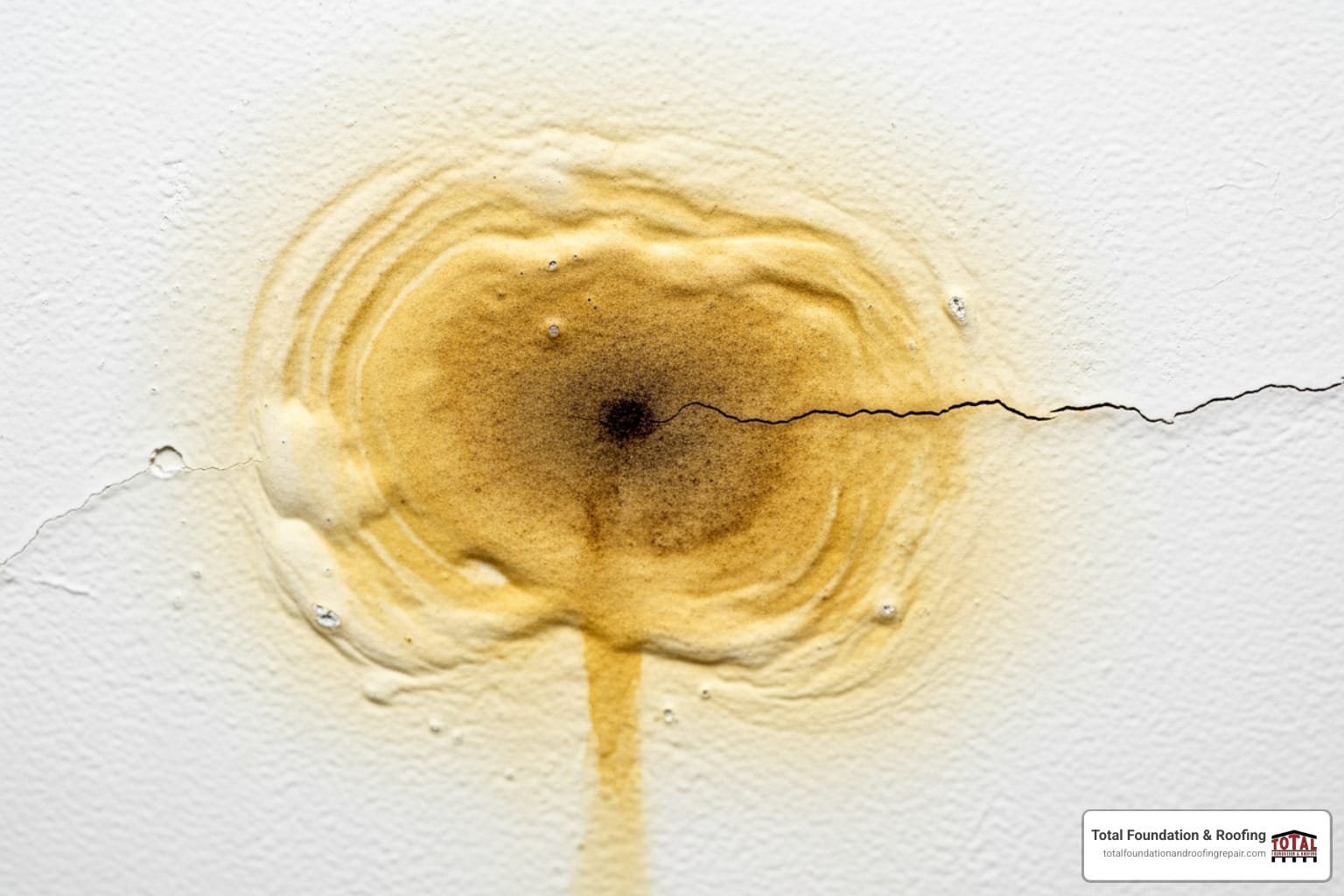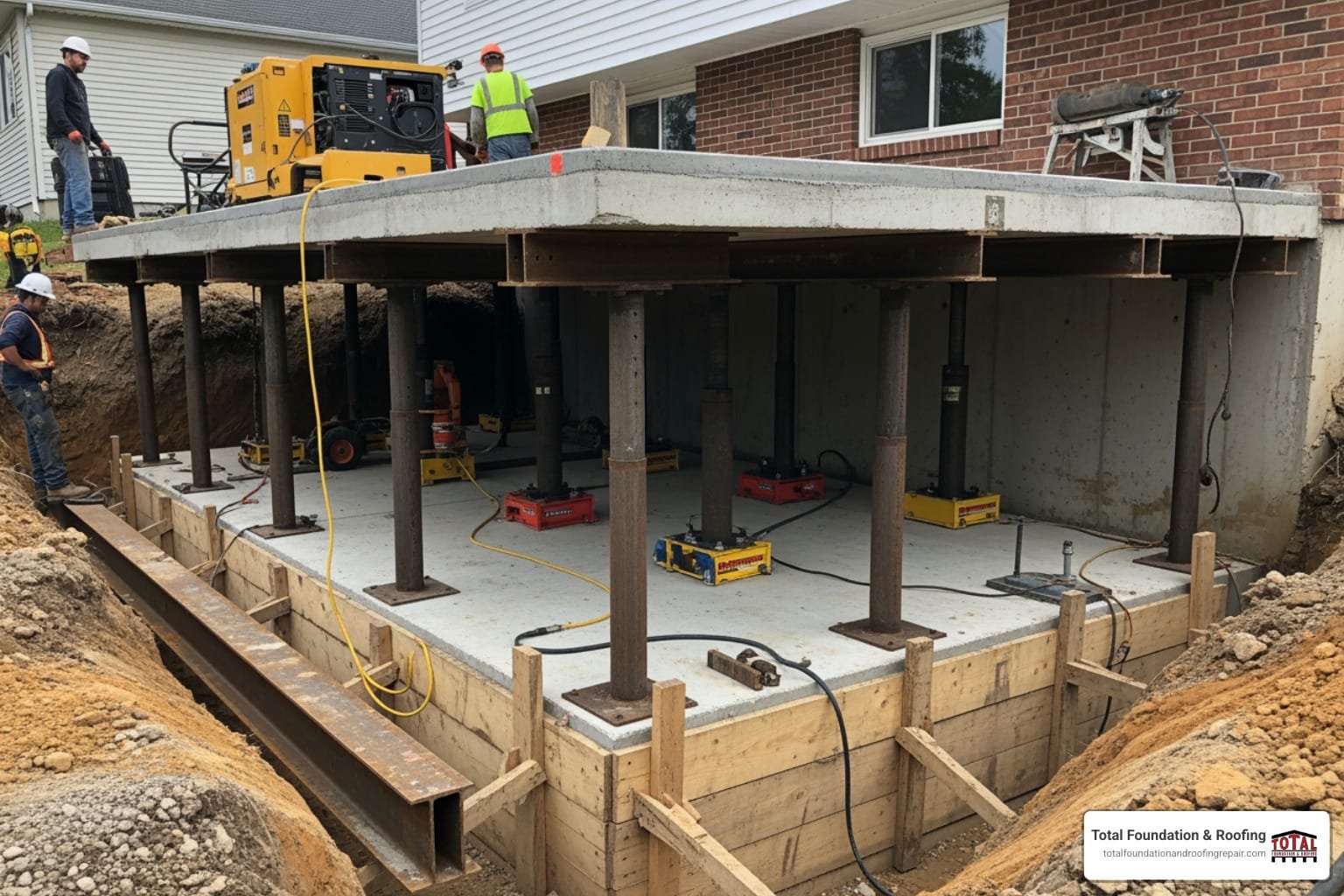Table of Contents
ToggleWhy San Antonio Homeowners Are Finding Basement Potential
Finding the right basement contractor san antonio can transform your home’s unused space into valuable living area, but the unique challenges of Texas Hill Country soil and climate require specialized expertise.
Average Costs in San Antonio:
- Basement finishing: $8,448 average
- Foundation repair: $2,500 – $10,500
- Excavation: $50 – $100 per sq ft
While basements aren’t traditional in San Antonio due to caliche soil and slab-on-grade construction, growing demand for storm protection and extra living space is changing the landscape. The city’s expansive clay soils and occasional flash flooding create unique waterproofing challenges that require contractors experienced with local conditions.
Smart homeowners are finding that finished basements can provide:
- Additional living space for multigenerational families
- Storm shelter protection
- Potential rental income
- Up to 70% return on investment
I’m Daniel Sowell, owner of Total Foundation & Roofing Repair with over 18 years of experience in Texas Hill Country construction, including foundation work that’s essential for successful basement projects. My team understands the specific soil and moisture challenges that make choosing the right basement contractor san antonio crucial for long-term success.
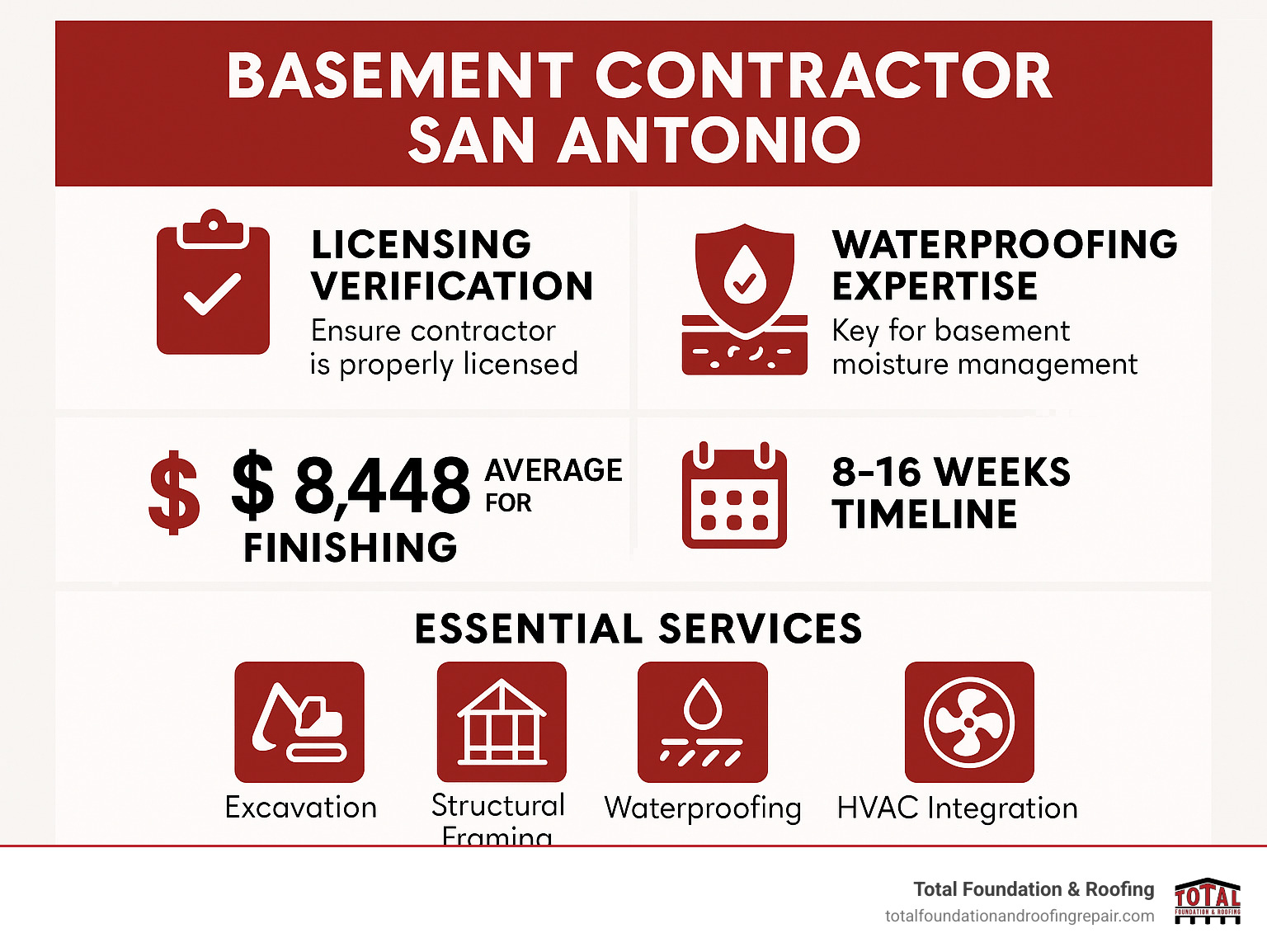
Key basement contractor san antonio vocabulary:
Why Basements Are (and Aren’t) Common in San Antonio
If you’ve lived in San Antonio for any length of time, you’ve probably noticed something: basements are about as rare as snow in July. Drive through any established neighborhood, and you’ll see home after home built on concrete slabs, sitting right on the ground like they’re afraid to dig deeper.
There’s a good reason for this. San Antonio sits on some of the most challenging soil you’ll find anywhere in Texas. We’re talking about caliche – a cement-like hardpan that’s tougher than a two-dollar steak – mixed with expansive clay soils that swell and shrink like a sponge in a rainstorm.
For decades, local builders took the path of least resistance: slab-on-grade construction. It’s faster, cheaper, and doesn’t require wrestling with our difficult soil conditions. But times are changing. With home prices climbing and families looking for more space, tornado shelter needs, and the growing trend toward multigenerational living, more homeowners are asking their basement contractor san antonio about going underground.
Unique Hill Country Challenges
Expansive clay is our biggest nemesis. When this soil gets wet, it can expand up to 10% of its original size. When it dries out, it contracts just as dramatically, creating a constant push-and-pull that can crack foundations and cause walls to bow.
Flash flood risk is another reality we live with in the Hill Country. Those beautiful rolling hills that make our area so scenic also create drainage challenges. When storms hit, water moves fast and hits hard.
Then there’s the limestone rock that lies beneath much of our area. On one hand, it makes excavation more expensive and time-consuming. On the other hand, once you get through it, limestone actually provides excellent natural drainage – if your contractor knows how to work with it properly.
Benefits That Outweigh the Obstacles
Despite all these challenges, the benefits of a well-built basement in San Antonio are compelling.
- Extra square footage is the obvious win. A finished basement can add anywhere from 500 to 2,000 square feet of usable space to your home.
- Multigenerational living is becoming more common, and a basement suite offers the perfect solution. Your aging parents get their independence and privacy, while staying close enough for you to help when needed.
- The income suite potential is real money. A properly finished basement with its own entrance can generate rental income that helps with mortgage payments.
- Energy efficiency is a hidden benefit. Underground spaces naturally maintain more stable temperatures, which means your HVAC system doesn’t have to work as hard.
- The ROI of up to 70% makes basement finishing one of the better home improvement investments you can make.
Basement Contractor Services You’ll Find in the Alamo City
Finding the right basement contractor san antonio means understanding the full scope of services available in our unique Hill Country market.
Basement excavation forms the foundation of every project – literally. In San Antonio, this means tackling our notorious caliche soil and limestone bedrock with specialized equipment.
Structural framing comes next, where contractors install the bones of your new space. This includes foundation walls engineered to resist soil pressure and support beams that won’t buckle under load.
Finishing and remodeling transforms that raw underground space into somewhere you actually want to spend time. This covers everything from drywall and flooring to electrical work and paint.
Egress windows are large, specially designed windows that provide emergency exits from basement bedrooms. Building codes require them, and they bring natural light into your space.
Modern sump systems are your best friend in San Antonio’s flash-flood-prone climate. These drainage systems and pumps work around the clock to keep groundwater from turning your basement into an indoor swimming pool.
Insulation upgrades and HVAC extensions keep your basement comfortable year-round while preventing moisture problems. Dehumidifiers work alongside your HVAC system to maintain that perfect balance of temperature and humidity.
For the foundation aspects that make basement construction possible, our comprehensive Foundation Repair Services ensure your project starts with a rock-solid base.
Specialized Add-Ons
Home theaters are incredibly popular in San Antonio, and basements provide the perfect dark, quiet environment for movie magic.
Gym spaces make perfect sense in basements – they’re private, temperature-controlled, and you don’t have to worry about bothering neighbors with your 5 AM workout routine.
Wet bars turn basements into entertainment hubs where friends and family naturally gather.
Wine cellars are particularly valuable in our hot Texas climate. Basements naturally maintain cooler, more stable temperatures than above-ground spaces.
Storm bunkers address a real safety concern in our tornado-prone region. Reinforced basement spaces can provide life-saving protection during severe weather.
Essential Waterproofing & Drainage Solutions
Waterproofing isn’t the most exciting part of basement construction, but it’s absolutely critical in San Antonio. Our clay soils and flash flood potential make moisture control the difference between success and disaster.
French drains work like underground highways, directing water away from your foundation. Vapor barriers provide a simple but effective shield using plastic sheeting to prevent moisture from entering your space.
Sump pumps are the workhorses of basement drainage systems, automatically removing water during heavy rains. Exterior membranes applied to basement walls provide your first line of defense against water intrusion.
Our specialized Foundation Waterproofing services address these critical moisture control aspects that make basement projects successful in our challenging Hill Country climate.
Choosing the Right Basement Contractor San Antonio
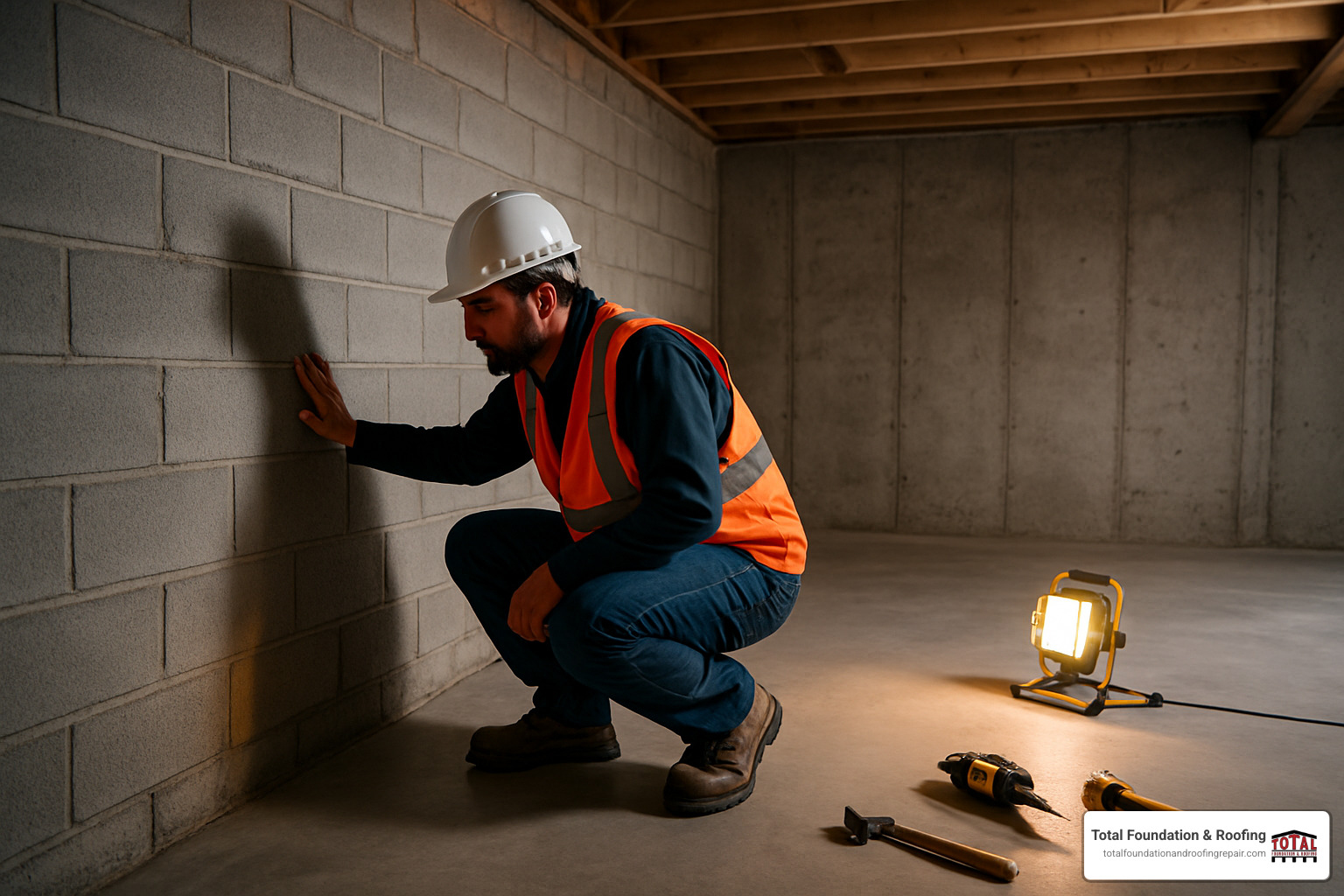
Finding the right basement contractor san antonio can feel overwhelming, but breaking it down into key factors makes the process much clearer.
Licensing and insurance should be your first checkpoint. Every legitimate contractor in Texas must carry proper licensing and adequate insurance coverage.
Experience with local soils separates the pros from the wannabes. San Antonio’s caliche and expansive clay soils require specialized knowledge that only comes from years of working in our area.
Portfolio review tells the real story. Request photos of completed basement projects in the San Antonio area, paying close attention to waterproofing details and finish quality.
References and BBB records provide crucial third-party validation. Contact previous customers directly and check Better Business Bureau ratings to understand how contractors handle problems and customer service.
Itemized bids separate professional contractors from fly-by-night operations. Detailed written estimates should break down labor, materials, timeline, and all associated costs.
Timeline guarantees matter because basement projects disrupt your entire home. Most basement projects take 8-16 weeks depending on complexity.
8 Must-Ask Questions Before You Sign
Before hiring any basement contractor san antonio, get answers to these critical questions:
Permits – Who obtains required permits and handles inspections?
Structural engineer involvement – Will an engineer review the project?
Moisture testing – How will you test for existing moisture issues?
Warranty length – What guarantees do you provide?
Cleanup policy – Who handles debris removal?
Material sourcing – Where do materials come from?
Project schedule – What’s the detailed timeline?
Change-order fees – What do modifications cost?
Red Flags to Avoid
No written estimate tops the list of warning signs. Legitimate contractors always provide detailed written estimates.
Vague scope indicates a contractor who doesn’t understand the project complexity.
Unusually low bids often mean corners will be cut or the contractor doesn’t understand the work required.
Pressure sales tactics signal desperation rather than confidence. Professional contractors don’t need to pressure you into immediate decisions.
Costs, Materials & Design: Planning Your Budget Wisely
Let’s talk numbers – because understanding basement construction costs upfront helps you avoid sticker shock later. In San Antonio, your investment varies dramatically based on what you’re trying to achieve and the unique challenges your property presents.
Average finishing costs run $35-$70 per square foot, with most San Antonio homeowners spending around $8,448 for a complete basement finishing project.
Excavation costs represent the biggest variable in your budget at $50-$100 per square foot. Here’s where San Antonio’s notorious caliche and limestone bedrock can really impact your wallet.
Plumbing rough-in work typically adds $1,500-$3,000 to your project if you’re adding bathroom facilities.
Electrical circuits for your basement usually run $1,000-$2,500, covering new circuits, outlets, lighting, and potentially upgrading your main electrical panel.
HVAC zoning to extend your heating and cooling system typically costs $2,000-$5,000.
Permit fees with the City of San Antonio range from $500-$2,000 depending on your project scope.
Best Flooring & Wall Systems for Humid Texas Basements
Choosing the right materials for San Antonio’s climate isn’t just about looks – it’s about preventing costly moisture damage down the road.
Epoxy flooring stands as your best defense against moisture intrusion. Unlike simple floor paint, epoxy creates a seamless, waterproof seal that prevents water penetration while providing a durable, attractive surface.
Luxury vinyl plank (LVP) offers the perfect balance of beauty and practicality. Completely waterproof and available in stunning wood and stone patterns, LVP installs easily and provides comfortable footing.
Ceramic tile provides unlimited design possibilities while offering excellent moisture resistance.
For wall systems, metal stud framing outperforms traditional wood framing in our humid conditions. Metal studs won’t rot, warp, or support mold growth – critical advantages in Texas basements.
Closed-cell spray foam insulation provides superior moisture barrier properties while delivering excellent energy efficiency.
Mold-resistant drywall represents an essential upgrade for basement applications.
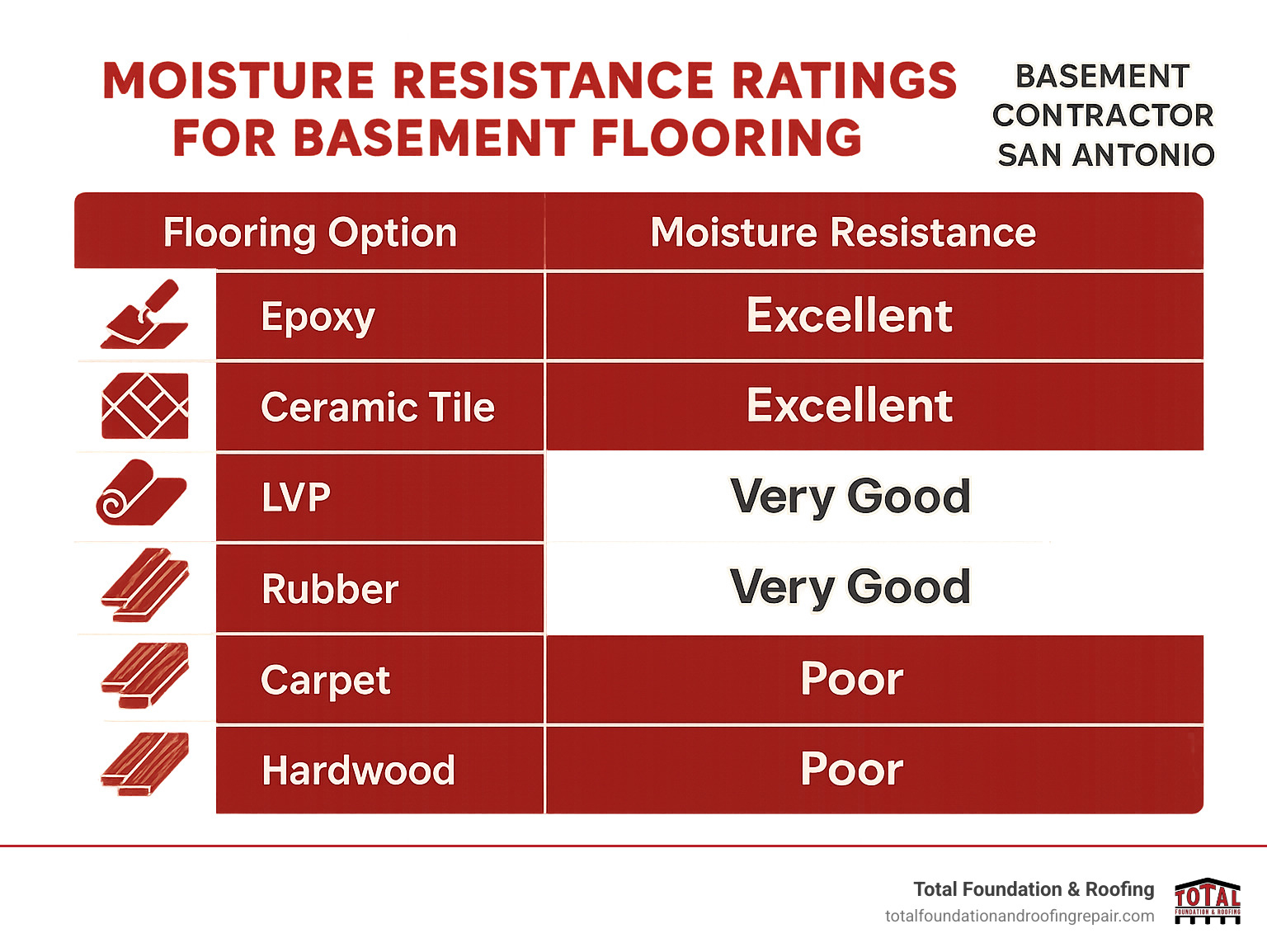
Waterproofing ROI and Warranty Expectations
Think of proper waterproofing as insurance for your basement investment. The upfront cost pays dividends through prevented damage and maintained property value.
Lifetime transferable warranties on structural work represent the gold standard in contractor confidence.
10-year waterproofing guarantees should be your minimum expectation for quality waterproofing systems.
For foundation-related aspects of your basement project, our crack repair services provide long-term solutions that protect your entire basement investment.
Permits, Codes & The Construction Timeline
Navigating the regulatory maze of basement construction in San Antonio doesn’t have to be overwhelming. Understanding what’s required upfront saves you time, money, and frustration down the road.
City of San Antonio building permits are mandatory for all basement construction projects. Your basement contractor san antonio should handle the entire permit application process for you. Plan for 2-4 weeks for permit processing.
ICC egress codes are non-negotiable when creating basement bedrooms. These International Code Council regulations ensure people can escape quickly in emergencies.
Energy code R-values for basement insulation help keep your space comfortable year-round. Texas energy codes typically require R-13 to R-15 insulation in walls and R-19 to R-30 in ceilings.
Most basement projects take 8-16 weeks depending on complexity. Simple finishing projects fall on the shorter end. Full excavation and construction projects naturally take longer.
What Happens Week-by-Week
Weeks 1-2 bring demolition and excavation – the messiest phase of your project. Expect significant debris and noise during this phase.
Weeks 3-4 focus on shoring – installing temporary supports to prevent cave-ins during construction.
Weeks 5-6 involve the slab pour – installing your basement floor with proper vapor barriers and drainage systems.
Weeks 7-8 bring framing – building interior walls and installing support structures.
Weeks 9-10 cover MEP rough-ins – installing mechanical, electrical, and plumbing systems before walls are closed up.
Weeks 11-12 focus on insulation – adding insulation and vapor barriers to control moisture and temperature.
Weeks 13-14 bring drywall and texture – hanging and finishing drywall, applying texture, and priming surfaces.
Weeks 15-16 complete finishes and punch-list items – installing flooring, trim, fixtures, and completing final details.
Final inspection by the city ensures all work meets code requirements before you can officially use your new space.
Signs You Need Repair—Not Just a Remodel
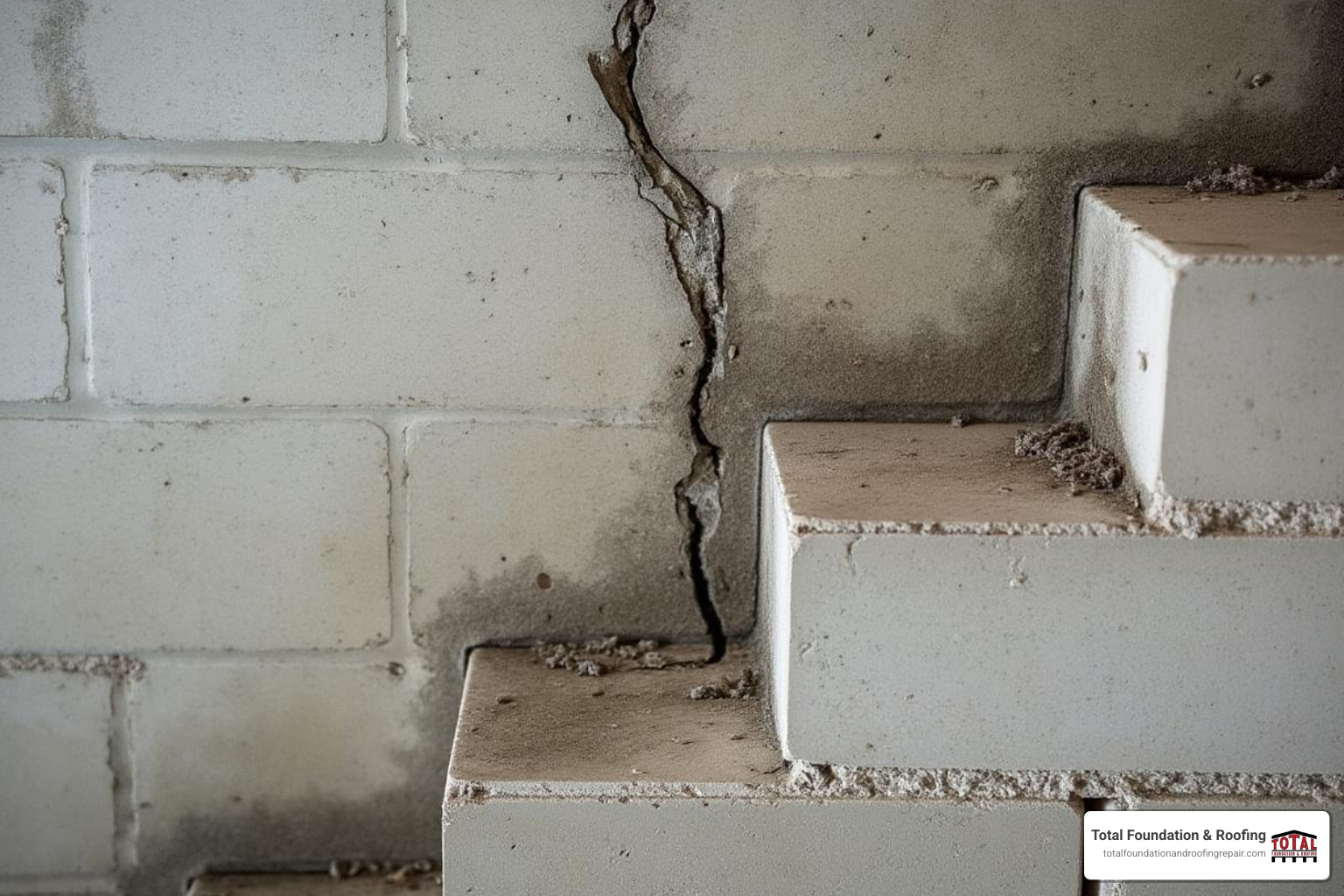
Before you start picking out paint colors and flooring samples, you need to honestly assess whether your basement has underlying problems that could turn your renovation into a nightmare.
Stair-step foundation cracks are your basement’s way of waving a red flag. These diagonal cracks indicate foundation settling or soil movement. In San Antonio’s expansive clay soils, these cracks often appear during our dry seasons when the soil contracts.
That musty odor that hits you when you open the basement door indicates moisture problems and potential mold growth lurking behind walls or under floors.
Efflorescence – those white, chalky deposits you see on basement walls – appear when water moves through concrete, carrying dissolved minerals that crystallize on the surface.
Bowing walls are perhaps the most serious warning sign. When basement walls curve inward, it means soil pressure is literally pushing against your foundation.
Uneven floors that slope or have noticeable high and low spots indicate foundation settlement.
Our concrete leveling services address many of these underlying foundation issues, creating a stable base for your basement finishing project.
When to Call a Professional ASAP
Standing water in your basement indicates serious drainage or waterproofing failures that will destroy any finishing work you attempt.
Active mold visible on walls, floors, or ceilings requires professional remediation before any construction work begins.
Rapid crack widening indicates active foundation movement happening right now. If you can measure crack growth over days or weeks, you need immediate structural evaluation.
DIY Fixes That Often Fail
Hydraulic cement patches might stop a leak temporarily, but they don’t address the underlying water source. Water will find new paths around your patches.
Paint-on sealers might make your basement walls look better temporarily, but they often fail under hydrostatic pressure.
Portable dehumidifiers can’t solve serious moisture problems. Running a small dehumidifier in a basement with active water intrusion is like trying to empty a swimming pool with a teacup.
The bottom line? If you’re seeing any of these warning signs, invest in proper repairs before you invest in basement finishing.
Frequently Asked Questions About Hiring a Basement Contractor San Antonio
How much does it cost to finish a 1,000 sq ft basement here?
For a 1,000 square foot basement in San Antonio, you’re looking at $35,000-$70,000 for complete finishing.
The lower end gets you basic finishing with simple materials – painted drywall, basic carpet or vinyl flooring, standard electrical outlets, and minimal plumbing.
The upper range includes luxury touches like custom tile work, built-in entertainment centers, full bathrooms with high-end fixtures, wet bars with plumbing, and premium flooring materials.
Most San Antonio homeowners fall somewhere in the middle, spending around $50,000-$55,000 for a well-finished basement with good materials, a half-bath, and quality flooring. This investment typically returns up to 70% of its cost in added home value.
Do I really need waterproofing in semi-arid Bexar County?
Absolutely yes. San Antonio’s clay soils are the real challenge, not just rainfall amounts. When we do get rain – especially during those intense Hill Country storms – our expansive clay soils absorb water like a sponge. This creates hydrostatic pressure against basement walls that can force water through even small cracks.
Our humidity levels also create condensation problems that can lead to mold growth and material damage. Even without active leaks, moisture vapor can destroy drywall, carpet, and wooden materials over time.
Proper waterproofing isn’t just about keeping water out – it’s about protecting your investment and your family’s health.
How long will permits take with the City of San Antonio?
Plan on 2-4 weeks for permit processing with the City of San Antonio. Your basement contractor san antonio should handle all permit applications and understand exactly what the city requires.
The permit process includes plan review, fee payment, and scheduling required inspections. Experienced local contractors know the city inspectors and understand their expectations, which can smooth the process considerably.
The city also requires multiple inspections during construction – electrical rough-in, plumbing rough-in, insulation, and final inspection. Each of these needs to be scheduled in advance.
Conclusion & Next Steps
Finding the right basement contractor san antonio isn’t just about getting the work done—it’s about partnering with someone who truly understands what makes our Hill Country unique. After 18 years working in these challenging conditions, I’ve learned that successful basement projects require more than just construction skills. They demand deep knowledge of our expansive clay soils, respect for our flash flood potential, and expertise in the specialized waterproofing techniques that keep basements dry in Texas.
At Total Foundation & Roofing, we’ve built our reputation on understanding these local challenges. Our certified crews have worked through countless projects where the foundation and structural elements make or break the entire investment. We’ve seen beautiful basement finishes ruined because contractors skipped proper foundation preparation or underestimated our soil conditions.
The truth is, every basement project in San Antonio starts with what’s underneath. Whether you’re dreaming of a cozy family room, a home theater, or a storm-safe retreat, the foundation work has to be absolutely right. That’s where our expertise in foundation repair, waterproofing, and concrete leveling becomes invaluable—we ensure your basement has the solid, stable base it needs to serve your family for decades.
Your basement investment should pay dividends through additional living space, storm protection, and increased property value. When done right, it becomes one of your home’s most valuable additions. When done wrong, it becomes an expensive headache that affects your entire house.
The key is choosing a contractor who won’t cut corners on the foundation aspects that you can’t see but absolutely can’t live without. Our approach focuses on getting the structural elements right first, then building beautiful, functional spaces that stand the test of time.
Ready to turn your basement dreams into reality? Contact us to discuss your basement vision and receive a free written estimate. We’ll walk you through exactly what it takes to create a successful basement project in our unique Hill Country conditions.
A successful basement project starts with a solid foundation. Let our experience guide you from initial planning through final inspection, ensuring every detail is handled with the care and expertise your investment deserves.


